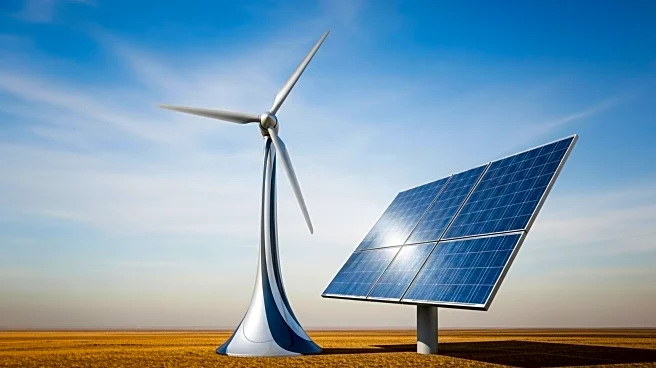What's Happening?
The International Energy Agency (IEA) has released a report forecasting that the global capacity of installed renewable energy will more than double by 2030. This growth is expected to be driven primarily by solar energy, which will account for approximately 80% of the increase in renewable power capacity over the next five years. The report highlights challenges such as supply chain issues, grid integration, and financing, but notes that the expansion of solar PV is facilitated by low costs and faster permitting processes. Other renewable sources like wind, hydro, bioenergy, and geothermal are also expected to contribute to this growth. The report indicates that geothermal installations are set to reach historic highs in key markets, including the United States, Japan, and Indonesia.
Why It's Important?
The projected increase in renewable energy capacity is significant for several reasons. It represents a major shift towards sustainable energy sources, which could reduce reliance on fossil fuels and decrease carbon emissions globally. This transition is crucial for addressing climate change and meeting international climate goals. The growth in renewable energy capacity also has economic implications, potentially creating new jobs and industries centered around renewable technologies. Countries like India are expected to become major players in the renewable energy market, which could alter global energy dynamics and trade relationships. Additionally, the expansion of renewables could lead to increased energy security and independence for many nations.
What's Next?
The IEA report suggests that emerging economies in Asia, the Middle East, and Africa will experience faster growth in renewables due to cost competitiveness and stronger policy support. Governments in these regions are introducing new auction programs and raising their renewable energy targets. In the United States and China, policy changes are impacting the growth forecast, with China shifting from fixed tariffs to auctions affecting project economics. However, other regions like India and Europe are revising growth prospects upward due to ambitious new policies and increased deployment of rooftop solar. Corporate purchase power agreements and utility contracts are expected to drive significant capacity expansion.
Beyond the Headlines
The shift towards renewable energy could have broader implications beyond environmental and economic factors. It may influence geopolitical relations as countries adjust their energy strategies and dependencies. The increased focus on renewables could also spur technological innovation and advancements in energy storage and grid management. Additionally, the transition may raise ethical considerations regarding land use and the impact on local communities, particularly in areas where large-scale renewable projects are developed.









